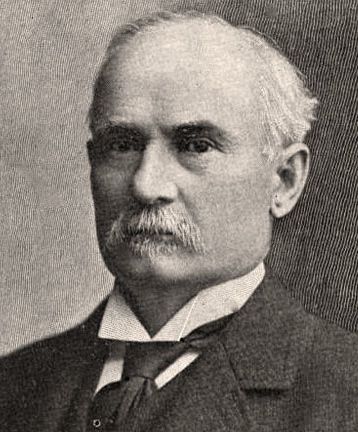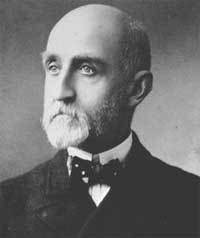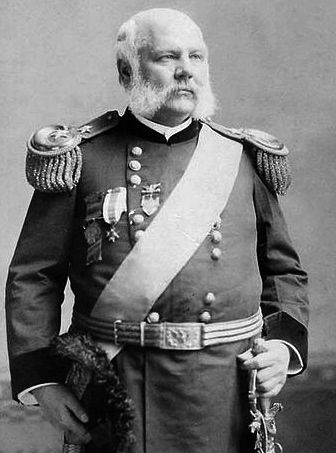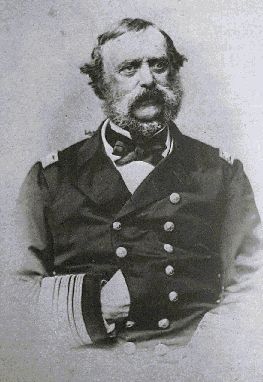 U.S. Representative Robert Hitt, Chairman of the Committee on Foreign Affairs, introduced the joint resolution of annexation of the Hawaiian Islands into the House of Representatives for debate on May 17, 1898. Hitt and other members of Congress attempt to justify the violation of international law, which ultimately passes the House of Representatives on June 15th and moves over to the Senate the following day.
U.S. Representative Robert Hitt, Chairman of the Committee on Foreign Affairs, introduced the joint resolution of annexation of the Hawaiian Islands into the House of Representatives for debate on May 17, 1898. Hitt and other members of Congress attempt to justify the violation of international law, which ultimately passes the House of Representatives on June 15th and moves over to the Senate the following day.
What these records reveal is that the act of war against the Hawaiian Kingdom, which stems from the United States admitted illegal overthrow of its government and deliberate failure to reinstate in 1893, was done with full knowledge and intent. The underlying purpose for the joint resolution was to take advantage of their puppet government that was installed by the United States Minister Stevens in 1893 calling itself in 1894 a so-called Republic, in order to seize the Hawaiian Islands during the Spanish-American War as a war measure. At the center of the plan was clearly the violation of Hawaiian neutrality under international law.
The Congressional record is foretelling of what the Hawaiian Islands have become today with 118 military sites that cover 20% of the territory of Hawai‘i and is headquarters for the United States Pacific Command together with its component commands of the U.S. Pacific Fleet headquartered at Pearl Harbor, U.S. Army Pacific headquartered at Fort Shafter, U.S. Marine Forces Pacific headquartered at Kane‘ohe Bay, and U.S. Pacific Air Forces headquartered at Hickam Air Base. All five of the headquarters are located on the Island of O‘ahu.
Here follows a snippet of Hitt’s testimony on the floor of the House of Representatives on June 11, 1898, and his reliance on military authorities that advocate seizing the Hawaiian Islands as a military necessity who testified before the House Committee on Foreign Affairs (vol. 31, Congressional Record, p. 5771-5772):
*******************************************************
Mr. HITT. I accept the opinion of men like Admiral Walker and Captain Mahan and General Schofield, Admiral Belknap, General Alexander, and Admiral Dupont and Chief Engineer Melville. It is a long list of great sailors and soldiers, distinguished strategists and authorities. The striking fact is that there is no dissent among them. These men, who are authorities, have all concurred as to the great importance of the islands. On one of the islands is Pearl Harbor, now unimproved, a possible stronghold and a refuge for a fleet, which, if fortified by the expenditure of half a million dollars and garrisoned and aided by the militia of the island and its resources, can be made impregnable to any naval force, however large.
I speak of a naval force. To capture it there must be a land force also. The possession of all the islands was stated by these able men, who were before the committee, to be essential, as they would furnish a valuable militia to promptly cooperate with a garrison of one or two regiments of artillery until, in the short distance from our shore, we could reinforce them with abundant military strength to repel the assault of the disembarking troops, who must come many thousands of miles farther than our own.
This is not my mere assertion or opinion on so grave a technical question. I am merely giving some of the leading points made by those whose names command the respect of the military and naval professions throughout the world and who have said that the possession not only of Pearl Harbor but of all that little group of islands is to us a necessity. I will give some expressions used by these distinguished authorities. I might give many more.
 Captain Mahan, the most distinguished writer and authority of our time on the history of sea power, says:
Captain Mahan, the most distinguished writer and authority of our time on the history of sea power, says:
“It is obvious that if we do not hold the islands ourselves we cannot expect the neutrals in the war to prevent the other belligerent from occupying them; nor can the inhabitants themselves prevent such occupation. The commercial value is not great enough to provoke neutral interposition. In short, in war we should need a larger Navy to defend the Pacific coast, because we should have not only to defend our own coast, but to prevent, by naval force, an enemy from occupying the islands; whereas, if we preoccupied them, fortifications could preserve them to us. In my opinion it is not practicable for any trans-Pacific country to invade our Pacific coast without occupying Hawaii as a base.”
 General Schofield, who spent three months on the islands and made a careful survey of Pearl River Harbor, stated to our committee:
General Schofield, who spent three months on the islands and made a careful survey of Pearl River Harbor, stated to our committee:
“Its secure anchorage for large fleets, its distance from the sea, beyond the reach of the guns of war ships, and the great ease with which the entrance to the harbor could be defended by batteries so as to make it a perfectly safe refuge for merchant shipping or naval cruisers, or even a fleet which might find it necessary under any circumstances to take refuge there; for coaling grounds, for navy-yard repair shops, storehouses, and everything of that kind.
The most important feature of all is that it economizes the naval force rather than increases it. It is capable of absolute defense by shore batteries; so that a naval fleet, after going there and replenishing its supplies and making what repairs are needed, can go away and leave the harbor perfectly safe under protection of the army. Then arises at once the question why this harbor will be of consequence to the United States. It has not been such subjects the study of a lifetime till now; but the conditions of the present war, it seems to me, ought to make it clear to everybody.
At this moment the Government is fitting out quite a large fleet of steamers at San Francisco to carry large detachments of troops and military supplies of all kinds to the Philippine Islands. Honolulu is almost in the direct route. That fleet, of course, will want very much to recoal at Honolulu, thus saving that amount of freight and tonnage for essential stores to be carried with it. Otherwise they would have to carry coal enough to carry them all the way from San Francisco to Manila and that would occupy a large amount of the carrying capacity of the fleet, and if they recoal at Honolulu all that will be saved. More than that, a fleet is liable at any time to meet with stress of weather, or perhaps a heavy storm, and there might be an accident to the machinery which will make it necessary to put into the nearest port possible for repairs and additional supplies. By the time it reaches there its coal supply may be well-nigh exhausted; it then has to replenish its coal supply to carry it to whatever port it could reach.
If I am not misinformed in regard to the laws of neutrality, the supply of coal that can be taken on board at neutral ports is only sufficient to bring it back to the nearest home port, and not enough to carry it across the ocean, so that if we had to regard Honolulu as a neutral port, we could only load up coal enough to bring us back to San Francisco. Now, let us suppose, on the other hand, that the Spanish navy in the Pacific as well as in the Atlantic, or both, were a little stronger than ours instead of being somewhat weaker. The first thing they would do would be to go and take possession of the Sandwich Islands and make them the base of naval operations against the Pacific coast.
You have only to consider to state of mind which exists all along the Atlantic coast under the erroneous apprehension that the Spanish fleet might possibly assail our coast to see what would be the case if the Spanish fleet were a good deal stronger than ours and took possession of Honolulu and made it a base of operations in attacking the points on the Pacific coast. We would be absolutely powerless, because we would have no fleet there to dispute the possession of the Sandwich Islands, whereas, if we held that place and fortified it so that a foreign navy could not take it, it could not operate against the Pacific coast at all, for it could not bring coal enough across the Pacific Ocean to sustain an attack on the Pacific coast. Then the Sandwich Islands would be a base for naval operations just as Puerto Rico is against the Atlantic coast. If Spain is strong enough to hold Puerto Rico, so that a squadron can replenish with supplies—coal, ammunition, and provisions—there, the whole Spanish fleet can raid our Atlantic coast at will.
It happens that in this war we have picked out the only nation in the world that is a little weaker than ourselves. The Spanish fleet on the Asiatic station was the only one of all the fleets we could have overcome as we did. Of course that can not again happen, for we will not be able to pick up so weak an enemy next time. We are liable at any time to get into a war with a nation which has a more powerful fleet than ours, and it is of vital importance, therefore, if we can, to hold the point from which they can conduct operations against our Pacific coast. Especially is that true until the Nicaragua Canal is finished, because we can not send a fleet from the Atlantic to the Pacific. We can no send them around Cape Horn and repel an attack there. If we had the canal finished, we would be much better off in that respect; but even then we would want the possession of a base very much.
We got a preemption title to those islands through the volunteer action of our American missionaries who went there and civilized and Christianized those people and established a Government that has no parallel in the history of the world, considering its age, and we made a preemption which nobody in the world thinks of disputing, provided we perfect out title. If we do not perfect it in due time, we have lost those islands. Any else can come in and undertake to get them.
So it seems to me the time is now ripe when this Government should do that which has been in contemplation from the beginning as a necessary consequence of the first action of our people in going there and settling those islands and establishing a good Government and education and the action of our Government from that time forward on every suitable occasion in claiming the right of American influence over those islands, absolutely excluding any other foreign power from any interference.”
The same eminent and experience soldier, when asked whether it would be sufficient to have Pearl Harbor without the islands, said we ought to have the islands to hold the harbor; that if left free and neutral complications would arise with foreign nations, who would take advantage of a weak little Republic with claims for damages enforced by war ships, as is frequently seen. If annexed, we would settle any dispute with a foreign nation; that we would be much stronger if we owned the islands as part of our territory, and would then also have the resources of the islands, which are so futile, for military supplies; that if we do not have the political control they may become Japanese; and we would be surrounded by a hostile people.
Admiral Walker, who has had long experience in the waters of the Hawaiian Islands, emphatically confirmed the views of General Schofield, especially that it would cost far less to protect the Pacific coast with the Hawaiian Islands than without them; that it would be taking a point of advantage instead of giving it to your enemy.
 Admiral Dupont, in a report made as long ago as 1851, expressed his views in these words:
Admiral Dupont, in a report made as long ago as 1851, expressed his views in these words:
“It is impossible to estimate too highly the value and importance of the Sandwich Islands, whether in a commercial or military point of view. Should circumstances ever place them in our hands, they would prove the most important acquisition we could make in the whole Pacific Ocean—an acquisition intimately connected with our commercial and naval supremacy in those seas.”

Wow, there is so much overwhelming evidence that the U.S. knowingly and willfully intended to committ crimes against the neutrality of the Hawaiian Kingdom. What amazes me is that even today when U.S. Fed, State, and County officials are confronted with this irrefutable evidence they choose not to do the right thing and continue to perpetuate the crime. Totally opposite of what they swore to do.
Kekoa, you’re quite correct. These men appear very ignorant of international laws. Gen. Schofield is a retard to say the missionaries established our government; we had a king with absolute authority and it was his idea to reform the governance of the kingdom and it was he that established the constitutional monarchy. with Richards educating the ali’i at their request and the decision was the king’s to make; not theirs. In 1854, the kingdom declared its neutrality and helped formulate the guidelines. The treaties we held with various major countries insured our sovereignty. Only U.S. Americans were anxious over the status of the kingdom and their thirst for naval dominance in the Pacific and a penchant of fear to feed their egos. Much of their factual conspiracy have been preserved in their Library of Congress in congressional records, journals, news-clippings, and personal letters, etc.
It seems like they didn’t care because most of them were puppets to the Free Masons and felt they was invincible on the Hawaiian Islands giving the Hawaiian Kingdom and it’s subjects no respect at all….
It appears that the U.S. actually evaluated the Risk v. Reward to take the
Hawaiian Islands in that secret session. And their goal: “perfect out title.”
“We got a preemption title to those islands through the volunteer action of our American missionaries who went there and civilized and Christianized those people and established a Government that has no parallel in the history of the world, considering its age, and we made a preemption which nobody in the world thinks of disputing, provided we perfect out title. If we do not perfect it in due time, we have lost those islands. Any else can come in and undertake to get them.”
They had no intentions of turning back. This was a mission void of risk, all or
nothing, go big or go home!
The hewa that the U.S. had implemented nearly 122 years ago is now knocking
at their door. Perhaps hard to recognize and accept at first, a pill hard to swallow!
Their admission on record for preemption discloses their intent to condition, or to
groom the young country setting it up to take advantage of its vulnerability while
setting the stage to deflect disputes form the global community should the young
country cry for help! Sounds sick doesn’t it? Wow, the parallel! Evil!
No wonder there was no risk, they were blinded by evil!
Hawai’i cried for help in the 1897 Ku’e petition!
and…the old “We better do it before someone else does” just doesn’t justify what was done!
“We better do it before someone else does” was nothing more then an excuse by the United States to justify their illegal acts. The United States is famous for making up lame excuses such as Weapons of Mass Destruction, Terrorist and Homeland Security to justify their evil deeds even against their own people.
EVIL…….is too good of a word for them!!!
Ke Akua’s Will, will be done for everyone on earth and in heaven today Amen
It’s truly time for us to dispel the myth that pineapple and sugar businessmen were at the heart of the overthrow. Its a narrative that is told in such a way that it confuses people, ourselves included. This is the actual history that needs to be told; readily on the tips of our nakeiki tongues, are the stories of Thurston and Dole. New names to memorize in the true history of Hawaii.
This history is absolutely fascinating and to see a restoration of the kingdom would be so beneficial to the people and the Aina. A legal approach to Hawaiian Sovereignty is a peaceful non confrontational solution and Immigration laws are the the most sensible answer to taking control of the over development of the precious islands. I am passionate and love to share this knowledge with others. A question came up recently. Did Kamehameha I illegally occupy Oahu using his armed forces? I understand he “conquered” but how is that different than illegal occupation?
Pamela Sue, You re confusing the time periods and the evolution keeping up with the times. The vision of Kamehameha was a wise one to consolidate the islands under one rule instead of conflicts with other major countries dividing the islands and disrupting the inter-relations of the Ali’i and people, especially with families that had close kin on all islands. Putting the islands under one rule strengthened the islands against foreign intrusion. Kamehameha the great’s relationship with Vancouver opened his eyes about the “outside” world and the relations nations had with each other. He realized the importance of enjoining into those relationships and worked toward that goal.
Because of understanding how the relationships worked, Kamehameha the Great and his successors worked to form their relationships compatible to the other nations. His son, Kauikeaouli, commissioned Richards to instruct him and his chiefs to learn the main principles of building a nation that would be embraced by other nations. His aim was to emulate and be accepted by the Family of Nations which he knew would enhance and protect his nation through agreements, compacts, and treaties. Within that construct, all nations followed international common laws.
Hawaii became comparable, accomplished and active within the international arena. The Hawaiian Kingdom, being recognized as a sovereign, neutral nation-state and subject to international laws, solidified its status and peerage to the other nations; including the United States of America (also subject to international laws). In the end, the Hawaiian Kingdom received the recognition as being one of the most progressive, modern nation as well as being one of the wealthiest per capita in the world.
With this knowledge, there should be no confusion from you as to the difference you have referenced. I hope this has given you more clarity than you had possessed in your befuddlement.
yes absolutely. It is too bad so many on Oahu had to die in the battle because they did not see the “big picture” of uniting as one nation as Kamehameha the Great did.
Thank you.
Aloha Pamela Sue, your question” …Did Kamehameha I illegally occupy Oahu using his armed forces? I understand he “conquered” but how is that different than illegal occupation?…” Is a good question. The separate kingdoms in Hawaii were not parties to the Hauge and Geneva conventions, nor were they internationally recognized nation states. Their conflicts were not international armed conflicts so the laws of occupation would not apply. I’m pretty sure those laws were not even codified yet but countries relied on customary international laws back then. In simple terms, I guess it could be explained as tribal wars.